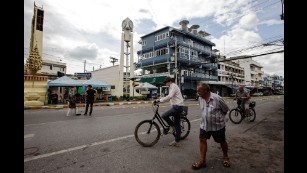Bangkok, Thailand – Investigators in Thailand detained and questioned two people in connection with the wave of bombings across the country Thursday and Friday, police said.
Four people were killed and more than 30 were injured when 11 bombings occurred in five provinces in Thailand in less than 24 hours.
There has been no claim of responsibility for the attacks yet, authorities say, and it’s not clear whether the bombings were connected.
Many of the blasts occurred near seaside resorts in the country, where the economy is heavily dependent on tourism.
Maj. Gen. Piyapan Mingmuang, a police spokesman, said Saturday that arrest warrants for the pair have not yet been issued. Police are waiting on court approval to issue them, Mingmuang added.
Political unrest has intensified in recent years in Thailand, resulting in protests at times.
The series of blasts comes days before the first anniversary of the Erawan Shrine bombing, which left 20 people dead, and five days after the country voted on a new constitution.
Political turmoil in Thailand
Authorities say they do not believe the attacks are related to last year’s Erawan attack or international terrorism. But police are calling the actions “local sabotage” and theorize the series of attacks could be the result of ongoing political turmoil in the country.

Thai voters on Sunday approved a controversial new draft constitution, which could give extra powers to the military, which took control following a coup in 2014. Some residents staunchly dislike the new constitution and believe it will legitimize the military’s rule.
Paul Quaglia, a Thailand security expert and 20-year veteran of the CIA, said the bombings are likely not directly related to the recent constitutional reforms, as it would be difficult to plan and execute coordinated explosions in such a short time.
There has been a political divide in Thailand between populists — or the so-called “Red shirts,” many of whom live in rural areas and are poor — and the urban middle class and elite in Bangkok — often referred to as “Yellow shirts” — who tend to back the Thai monarchy.
The 2006 removal of Prime Minister Thaksin Shinawatra spurred widespread protests over the next several years and resulted in mass demonstrations in 2010 and 2011.
A year later, his sister Yingluck was installed as the country’s new caretaker leader, but her tenure was plagued by allegations of her brother’s involvement — allegations she strenuously denied.
The situation reached a tipping point in 2013, as demonstrators demanded an end to Shinawatra politics. She was removed from office months later amid allegations of abuse of power.
As reported by CNN
